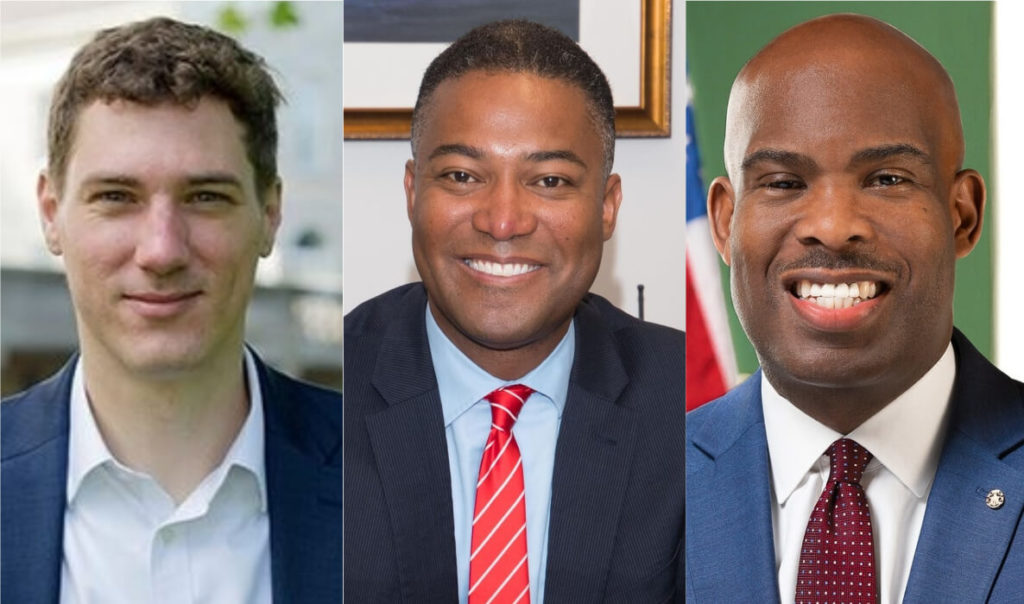Last week, I posited three things Mayor Kenney could do that would go a long way toward ensuring we don’t waste the $1.4 billion in funding the city stands to gain from the federal coronavirus relief act: reform our accounting procedures, appoint a “Stimulus Czar,” and ask regional stakeholders for help in implementing smart policy.
It has occurred to me since then that there’s another big-picture action the mayor ought to take, though it is something Jim Kenney has been loath to explore in the past. A city with a shrinking tax base, 25 percent poverty, and unsafe streets cannot compete in an increasingly global marketplace. So, rather than doubling down on the failed policies of the past, why not grow by coming to a meeting of the minds with our surrounding counties, thereby creating a new and massive economic engine?
Didn’t we almost have it all …
This is not a new idea. Back in the ‘90s, legendary Penn professor and public intellectual Ted Hershberg evangelized for a regional strategy, and came oh-so-close to enacting one. Today, though, we’re further from any type of regional framework than at any time since that valiant effort.
In 2019, Mayor Kenney admitted that he rarely even speaks to the elected leaders of Montgomery, Delaware, Chester and Bucks counties, or, for that matter, to leaders in South Jersey and Delaware. When he does chat them up, he told the Philadelphia Business Journal, it’s never about anything substantive.
That’s too bad. Because what Hershberg recognized in the ‘90s might be even more true today. In an increasingly globalized marketplace, it is regions—not states or cities—that are best positioned to compete economically. So rather than competing against one another for jobs, tax payers, and federal and state handouts, wouldn’t the southeastern Pennsylvania counties be stronger together?
Remember how excited many of us got when Philly competed for the Amazon headquarters? Well, how much more favorably might our bid have been received if, say, rather than Bucks County submitting a separate bid, all the counties signed on to one strategic pitch?
A city with a shrinking tax base, 25 percent poverty, and unsafe streets cannot compete in an increasingly global marketplace. So, rather than doubling down on the failed policies of the past, why not grow by coming to a meeting of the minds with our surrounding counties, thereby creating a new and massive economic engine?
“It became clear to me that you’ll never get political change in Philadelphia without the imposition of some outside force,” Hershberg, who has been retired from Penn for three years, said when I caught up with him this week. “Well, representatives of Southeastern Pennsylvania made up one-third of the General Assembly. If they were all rowing in the same direction, that kind of log-rolling would create a massive economic market force that could get a helluva lot from state political leadership.”
At one point in the mid-‘90s, Hershberg and other civic leaders convened over a thousand regional leaders at the Convention Center to map out a strategy. But, ultimately, what he calls “the stunning parochialism” of the region’s leadership doomed the project to failure. “I knew we were cooked when Ed Rendell, the mayor at the time, stood up and said, ‘Who’s ready to write Philadelphia a check?’” Hershberg recalls.
Hershberg had spent countless hours making the argument that a regional strategic plan, smartly done, would benefit both city and suburb. He had the data and the anecdotal case studies. “The Mall of America in the Twin Cities at the time was the largest mall in the United States,” he says. “Did you know that the retail taxes of the mall were shared by 170 different municipalities? Because they realized that working together meant everybody wins.”
How it’s worked in other places
Hershberg was part of a cabal of urban thinkers that were holding up old urban policy shibboleths to inspection. David Rusk—the former mayor of Albuquerque, New Mexico, and the son of former secretary of state Dean Rusk—penned Cities Without Suburbs and Baltimore Unbound: A Strategy for Regional Renewal, fueling the notion that the economic fate of suburbs were tied to the fortunes of cities, and vice-versa.
There are countless examples of the efficacy of regional thinking, like The Metropolitan Mayors Caucus, a membership organization of the Chicago region’s 275 cities, towns and villages. Founded in 1997 by then Chicago Mayor Richard M. Daley and leading mayors from nine suburban municipalities, the Caucus has long been a way for Chicago area leaders to work together on common goals that transcend arbitrary geographic boundaries.
When he was mayor, Michael Nutter flirted with replicating the Caucus here, but his talks with suburban leaders didn’t amount to much. But at least Nutter tried, realizing that governing a city as though it were an island in this day and age is an anti-growth recipe.
In an increasingly globalized marketplace, it is regions—not states or cities—that are best positioned to compete economically.
Sometimes, the fingerprints of regionalism aren’t all that visible. Media likes to champion the innovation that has emanated from Silicon Valley, but few reports delve into the nitty-gritty roots of that story.
As former Philadelphia Business Journal editor Craig Ey laid out in a 2019 column, at one point Silicon Valley wasn’t even a thing; it was just a cluster of communities near San Francisco, San Jose and Oakland. Entrepreneurs and political leaders created Joint Venture Silicon Valley, a kind of task force, and willed the entity into being, ushering in uniform permitting and licensing requirements throughout the region.
Ey also gives us the pro-growth story of Nashville, Tennessee, which he traces to a 50-year-old approval by voters of consolidating the city’s government with surrounding Davidson County. “From that point on, Nashville had no choice but to govern and act through regional consensus,” Ey writes. “Everyone in the metro area had a stake.”
Where we’re at in Philly
Now, these examples might not be the exact roadmap for Philadelphia, which already is its own county. And I doubt any merger of government functions between Philly and its surrounding counties will be politically palatable anytime soon. But that there is utterly no discussion of a regional strategy is nothing short of political malpractice—on the part of both city and suburban leaders, both of whom do fine electorally under the status quo.
City leaders are hooked on the crack cocaine of local politics—a regressive, worst-in-the-nation wage tax. And suburban leaders cry “taxation without representation” come election time to beat up on Philly.
Meantime, the Wayne businessman flies to L.A. for business and, while downing a few at the airport watering hole, doesn’t say “I’m from Wayne, Pennsylvania” when his new-found drinking buddy inquires as to his roots. He says he’s from Philly, and he says it proudly—so isn’t it high-time Philadelphia’s leaders say to him that we’re going to treat you as more of a citizen than an ATM machine? The devil is always in the details, but wouldn’t that potentially be a smart way for Philly and the ‘burbs to grow, together?
Hershberg says don’t hold your breath for political leadership in these parts to start thinking long-term. He isn’t surprised that regionalism has fallen out of favor in these ideological times.
“At one point, we interviewed 77 of the top 80 elected officials in Philadelphia’s surrounding counties,” he recalls. “And, I have to say, the quality of the state representatives was just abysmal. I remember one representative saying, ‘Policy? No one has time for policy. We monitor our calls from constituents and keep track of how many things we do for people, and if we keep that rate up, I get reelected.’ I remember the Speaker of the House Matt Ryan saying to me of his own colleagues, ‘Most of these guys couldn’t get a fucking job anywhere else.’ Sadly, that parochialism is still out there.”
Far be it from me to disagree with Hershberg—he’s got the battle scars and has earned the right to suggest that our political milieu is where smart, long-term policymaking goes to die. But in recent years we’ve also introduced you to others—modern-day Hershbergs, if you will—who are fighting the backwards power of our politics.
During a virtual event on April 13, we, along with Philly 3.0’s Jon Geeting, whose take on reforming county governments we’ll publish next week, we’ll welcome three folks to talk about the impacts of regionalism—City Councilperson Derek Green, Montgomery County’s Commissioner Ken Lawrence, and Chester County’s Commissioner Josh Maxwell We hope this will become an ongoing series featuring a wide array of viewpoints from our elected leaders.
We also hope it’s a conversation Hershberg would approve of. Join us, because we need a chorus of voices when it comes to overturning the dreaded way we’ve always done things. RSVP here, or via the event details below.
EVENT DETAILS
APRIL 13: MEET THE ELECTEDS: RESURRECTING REGIONALISM
Tuesday, April 13 at 6pm, via Zoom
How economically impactful would it be if Philadelphia and its surrounding counties combined efforts? Please join a conversation between City Councilperson Derek Green, Montgomery County Commissioner Ken Lawrence, and Chester County Commissioner Josh Maxwell that considers the possibilities for regional cooperation between city and suburb. Moderated by The Citizen’s Larry Platt, with Philly 3.0’s Jon Geeting.
Keep track of more upcoming Citizen events here.
Header photo courtesy of Visit Philly






